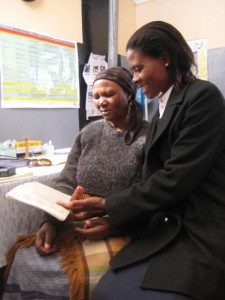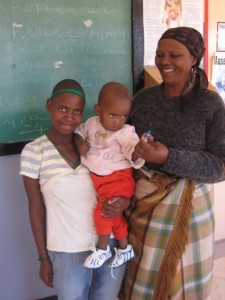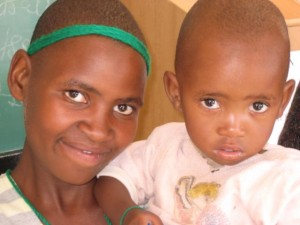At the Litsoeneng Health Centre, a small clinic in a remote area of Lesotho, Adelina, 40, a nurse, and Mabeata, 62, a community health worker in the nearby village of Khopolo, proudly tell the story of Tsepo. He’s a healthy 17-month-old boy who is learning how to walk and loves playing with other children. Mabeata and Adelina meet monthly to monitor his growth and make sure he stays healthy.
But this wasn’t always the case for Tsepo. When he was 8 months old, Mabeata visited his home to monitor his growth and discovered that he wasn’t gaining weight at a normal rate. Immediately, she encouraged his mother, Malehloa, only 16 years old, to take him to the clinic to correct the problem. After participating in a training workshop conducted by the Infant & Young Child Nutrition (IYCN) Project, the community health worker knew that it was critical to send babies with growth problems to the clinic as soon as possible. She even walked with Malehloa and Tsepo from Khopolo to visit the clinic.
“I was very concerned about Tsepo. I wanted to be there to help Malehloa understand the problem and coordinate with the nurses to follow up after the visit,” Mabeata explained.
At the clinic, Adelina—one of a small staff that includes three nurses and two counselors—asked the young mother questions about how she was feeding Tsepo. Malehloa, who stopped going to school once she was pregnant, had practiced exclusive breastfeeding since Tsepo was born. As a result, he had hardly been sick during his first six months and he was growing normally.
The problem with his growth probably started after that. Malehloa didn’t know that Tsepo needed complementary foods (other foods and fluids) in addition to breast milk to keep him well nourished now that he was older than 6 months.

Adelina, a nurse (right), and Mabeata (left) review Tsepo's growth chart together at the Litsoeneng Health Centre, April 2009.
To improve Tsepo’s nutrition, Adelina and Mabeata helped Malehloa identify foods she already had at home—like enriched porridge and fruits—that would be good for Tsepo. They encouraged her to continue to breastfeed in addition to feeding Tsepo enough nutritious complementary foods at the right frequency. To help him catch up on his growth as quickly as possible, Adelina gave Tsepo a nutritional supplement.
“I learned that breastfeeding alone does not satisfy the baby after six months, so I have to add other foods that are good for Tsepo,” said Malehloa.
Now, Mabeata makes frequent home visits to check Tsepo’s growth and ensure that Malehloa feeds him enriched porridge and other good foods several times a day. She smiles when she talks about how happy and healthy Tsepo is now. She has seen steady improvements in his growth.
“I am very proud. It gives me strength to see how Tsepo is growing,” she said.
Mabeata’s quick actions and persistent follow-up probably prevented Tsepo from becoming severely malnourished. In Lesotho, many babies, even those who have grown well for the first six months of life, do not receive adequate complementary foods—putting them at risk of malnutrition and making them more susceptible to severe childhood illnesses, stunted growth, developmental delays, and death. Volunteers like Mabeata are the critical link between communities and the life-saving prevention and treatment available at health facilities.
To prevent malnutrition, the IYCN Project is working to improve the links between health facilities and communities like Khopolo. IYCN provides infant and young child feeding training workshops for community health workers, emphasizing increased collaboration with health facilities. Since IYCN conducted a training workshop at the Litsoeneng Health Centre for Mabeata and 30 other community health workers—one for each village in the area—the clinic staff have seen an increase in referrals for growth-faltering from community health workers.

Mabeata, a community health worker, with Tsepo and his mother at the Litsoeneng Health Centre, April 2009.
Adelina believes that community health workers are vital to improving the health of mothers and children served by the clinic. She says it’s not always easy to get families to the facility. They often prefer to go to traditional healers in their villages or they do not have time to walk—sometimes more than six miles to the clinic
“We cannot afford to go house to house. If we need to get information to the villages, the community health workers are there on our behalf,” Adelina said.
Mabeata has all of the qualities necessary to go door to door to teach mothers about good feeding practices. She is well respected, empathetic, and a responsible mother—that’s why everyone at a village council meeting pointed to her when the clinic needed a volunteer to promote good health in the village 19 years ago. Her advice goes a long way toward making sure children have a chance for a healthy life.
“Now I tell other moms about Tsepo’s story and how we helped him. I think it motivates them to improve feeding practices for their babies,” Mabeata said.
Learn more about IYCN activities in Lesotho.
Date: Jul 6, 2009 | Category: Success stories

